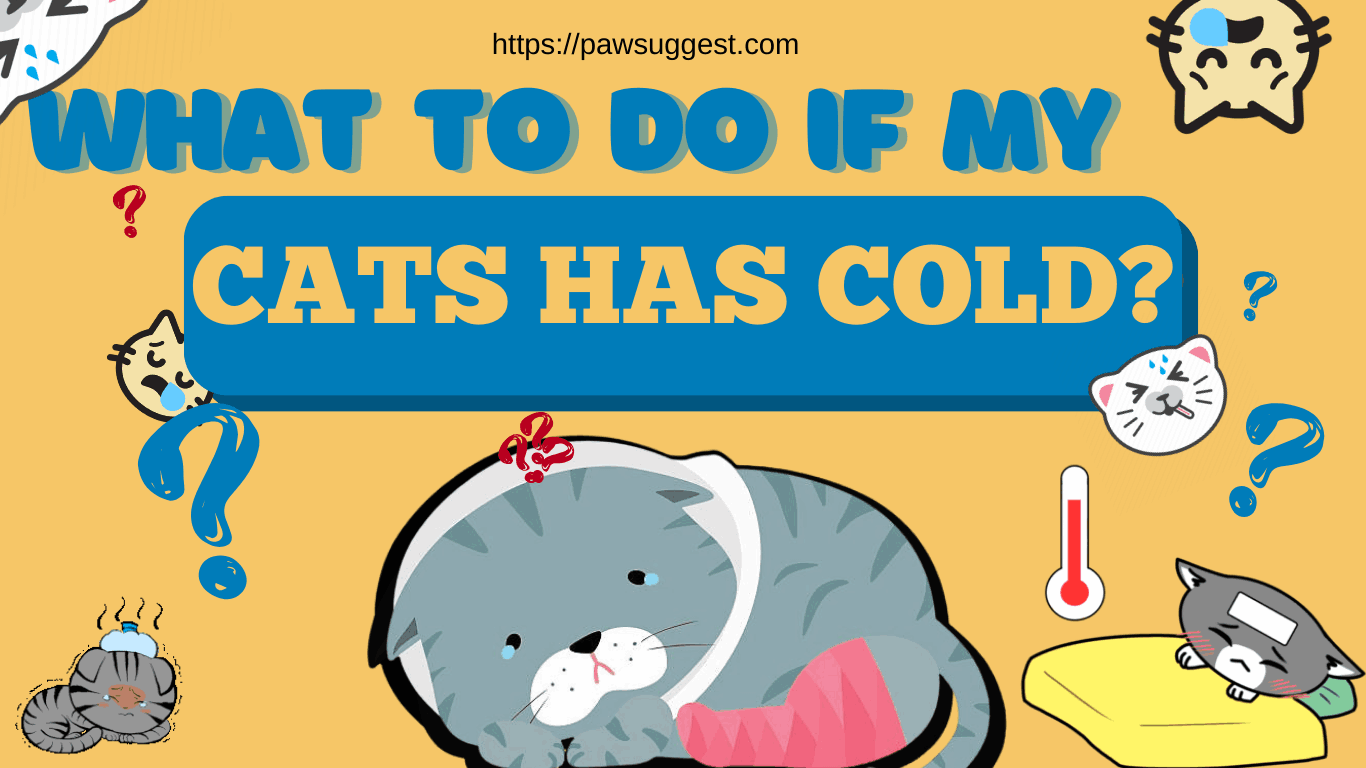Many pet owners may not be fully aware that cats can catch colds just like humans. These colds are often referred to as upper respiratory diseases in cats.
A cat cold is a general term that describes a group of symptoms, similar to the common cold in people. If your feline friend is sneezing or has a runny nose, there’s a strong chance they’ve caught a cat cold.
These upper respiratory infections are typically caused by a virus, leading to symptoms like sniffles and sneezing. If your cat shows these symptoms, it’s important to notice and seek advice on treatment.

Cold in Cats (Summary)
How Do Cats Catch Cold?
Cats can catch a cold from viral infections like feline herpesvirus or calicivirus. These viruses are contagious and affect multiple cats in close spaces like shelters. Symptoms include sneezing, runny eyes, and sniffling.
If a cat is infected with herpesvirus, the virus stays in the body and becomes dormant. Stressful events, like being groomed or boarded, can suppress the immune system and trigger symptoms.
Signs of a cold in a cat include:
- Sneezing
- Runny eyes
- Oral ulcers or sores if it’s calicivirus
- Vomiting (monitor your cat for this)
You can help prevent colds by ensuring your cat gets regular vaccines. Both indoor and outdoor cats are at risk of catching a cold. Outdoor cats are more exposed to sick animals, while indoor cats can contract it in boarding facilities.
To lower the chances of your cat developing an upper respiratory infection, make sure:
- You pick a reputable boarding provider
- You reduce stress levels for your cat
Cat Cold Symptoms
When your cat has a cold, you might see sneezing, coughing, and watery eyes. Additional signs include a runny nose, fever, and lethargy. These symptoms typically last seven to 10 days, but sometimes complications like a secondary bacterial infection can occur.
- Yellow-green discharge from the nose or eyes
- Loss of smell or taste, leading to a reduced appetite
- In severe cases: pneumonia, with coughing and difficulty breathing. (This may require hospitalization.)

Does Your Cat Have Allergy or Cold?
If your cat is showing symptoms like sneezing, watery eyes, or wheezing, it could have a cold. Colds usually come with:
- Coughing and sneezing
- No signs of digestive upset like bloating or gas
- No skin irritation or itchiness (common in allergies)
Unlike allergies, which tend to be a chronic issue, cold symptoms occur for a short time. If the cause isn’t clear, a visit to the vet is important.
Cat Cold Diagnosis
If your cat is not drinking water or cat is not eating, it might have a cold. A veterinarian will do a thorough examination, looking at your cat’s medical history and how the symptoms started.
- They might do routine diagnostic tests like blood work or chest X-rays to check for issues like pneumonia or asthma.
- For more severe upper respiratory signs, an upper respiratory PCR panel may be recommended.
- Swabs from the eyes or nose can help find the virus or bacteria causing symptoms.
What to Do if Your Cat Has a Cold?
If your cat has a cold and feels uncomfortable, start by:
- Wiping their runny nose and watery eyes with a clean cloth and saline solution.
- Using a humidifier can help with nasal congestion and prevent dry air.
If breathing is clogged or difficult, place your cat in a carrier with a bowl of hot water in front of the cage, covered with a blanket for 15 minutes.
To help your cat heal quickly:
- Ensure they continue to eat and drink.
- Offer reheated food that’s easier to swallow and provide a warm bed or cozy spot for snuggling.
In mild cases of cat colds, no medical treatment may be needed but consult your vet if severe signs appear. Antibiotics for cats might be necessary if there is a secondary bacterial infection. Keep your house cat in a warm environment with plenty of rest and reduce stress by ensuring a quiet space with essentials like the litter box, food, and water nearby.
When is the Right Time to See a Vet?
If your cat has a cold, it may seem harmless, often disappearing within 1-2 weeks. Keep an eye on their condition. If there’s no improvement by the fourth day, or if the symptoms are worsening, it’s time to consult your vet to avoid the risk of pneumonia.
Certain cats are more susceptible to the effects of a cold, including kittens, seniors, and those that are immunocompromised. Look out for the following warning signs:
- Stops eating or drinking for over 24 hours
- Coughing or difficulty breathing
- Green or yellow discharge from the nose
- Cat diarrhea lasting more than 24 hours
Be especially cautious with older and young cats, as well as those that are nursing or unvaccinated. If they fall into these categories, book an appointment with your vet immediately.
Bottom Line (Important)
Never give your cat medicine made for humans! If your cat has a cold, it’s important to contact your vet to avoid serious infections.
While most healthy cats recover in seven to 10 days without medical intervention, if they are elderly, a young kitten, or immunocompromised, watch for coughing, difficulty breathing, or if they stop eating, and seek help soon to prevent a longer recovery period.
FAQs
How do you treat a cat with a cold?
To help your cat feel better, use a humidifier or vaporizer to increase humidity in the house. Gently wipe their stuffy nose with a warm, damp cloth and cleanse their watery eyes with saline solution and gauze pads.
Do cat colds go away on their own?
Most cats recover from cold symptoms in seven to 10 days. However, some might face complications like secondary bacterial infection or even pneumonia.
What to do when your cat is cold?
Provide your cat with a warm, comfy bed to stay cozy. If they roam outside, make sure they have safe shelter in cold weather. You can also cuddle more, keep their activity levels up, and feed them more to help them stay warm.
Can indoor cats get colds?
Although indoor cats are less prone to developing colds than outdoor cats, they are not immune. Petting a sick cat or interacting with viruses or germs from outside the house can expose them to illness.

